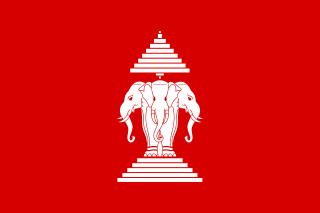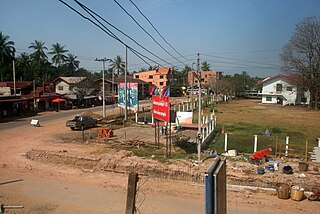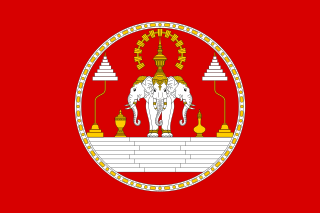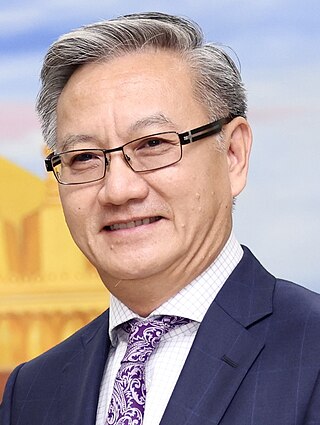
Kaysone Phomvihane was the first leader of the Communist Lao People's Revolutionary Party from 1955 until his death in 1992. After the Communists seized power in the wake of the Laotian Civil War, he was the de facto leader of Laos from 1975 until his death. He served as the first Prime Minister of the Lao People's Democratic Republic from 1975 to 1991 and then as the second President from 1991 to 1992.

The Lao People's Revolutionary Party (LPRP) is the founding and sole ruling party of the Lao People's Democratic Republic. The party's monopoly on state power is guaranteed by Article 3 of the Constitution of Laos, and it maintains a unitary state with centralised control over the economy and military.

The Kingdom of Laos was the form of government in Laos from 1947 to 1975. Located in Southeast Asia at the heart of the Indochinese Peninsula, it was bordered by Burma and China to the northwest, North Vietnam to the east, Cambodia to the southeast, and Thailand to the west and southwest. The country was governed as a constitutional monarchy beginning with its independence on 9 November 1953. It survived until December 1975, when its last king, Sisavang Vatthana, surrendered the throne to the Pathet Lao during the civil war in Laos, who abolished the monarchy in favour of a Marxist–Leninist state called the Lao People's Democratic Republic, which has controlled Laos ever since.

Nouhak Phoumsavanh or Phoumsavan was a longtime Pathet Lao revolutionary and communist party official who was the 3rd President of Laos from 1992 to 1998.

Savannakhet, officially named Kaysone Phomvihane ; since 2005 and previously known as Khanthaboury, is a city in western Laos. It is the capital of Savannakhet Province. With a population of 125,760 (2018), it is the second-largest city in Laos, after Vientiane. Although the old French colonial quarter of the town, along the Mekong River-front, is depressed and crumbling, the town's proximity to Thailand's booming economy has brought about new commercial development in the northern part of the town, near both the river crossing and the bus terminal.

Attapeu, also written as Attopu or Attapu, is the capital of Attapeu province, Laos. Its official name is Muang Samakhi Xay. It is the southernmost of provincial capitals in Laos.

The Royal Lao Government was the ruling authority in the Kingdom of Laos from 1947 until the communist seizure of power in December 1975 and the proclamation of the Lao People's Democratic Republic. The Franco-Lao Treaty of 1953 gave Laos full independence but the following years were marked by a rivalry between the neutralists under Prince Souvanna Phouma, the right wing under Prince Boun Oum of Champassak, and the left-wing, Lao Patriotic Front under Prince Souphanouvong and future Prime Minister Kaysone Phomvihane. During this period, a number of unsuccessful attempts were made to establish coalition governments.
The following lists events that happened during 1975 in Laos.
The following lists events that happened during 1976 in Laos.
The following lists events that happened during 1980 in Laos.
The following lists events that happened during 1981 in Laos.
The following lists events that happened during 1982 in Laos.
The following lists events that happened during 1988 in Laos.
The following lists events that happened during 1991 in Laos.
The following lists events that happened during 1992 in Laos.

The 1st National Congress of the Lao People's Party (LPP) was held in Vientiane on 22 March – 14 April 1955. The congress occurs once every five years. A total of 20 delegates attended the founding congress. In addition to the establishment of the Lao People's Party, its 1st Central Committee was elected at the congress with Kaysone Phomvihane as its General Secretary.

Kaysone Phomvihane Thought is a political ideology that builds upon Marxism–Leninism and Ho Chi Minh Thought with the political philosophy developed by Kaysone Phomvihane, the first leader of the Communist Lao People's Revolutionary Party (LPRP). It was first formalised by the LPRP at its 10th National Congress, held in 2016. The ideology includes views on the basic issues of the Laotian Revolution, specifically the application and development of Marxism–Leninism to the material conditions of Laos. The contents of Kaysone Phomvihane Thought was codified and developed by the LPRP with help from the Communist Party of Vietnam.
Saysomphone Phomvihane is a Laotian politician and member of the Lao People's Revolutionary Party (LPRP). He is the son of former LPRP General Secretary Kaysone Phomvihane and Thongvin Phomvihane. He served as Chairman of the Central Committee of the Lao Front for National Construction. He currently serves as President of the National Assembly.

Thongsavanh Phomvihane is a Laotian politician and member of the Lao People's Revolutionary Party (LPRP). He currently serves as Head of the LPRP Central Committee External Relations Committee, and is a member of the 11th Central Committee.











